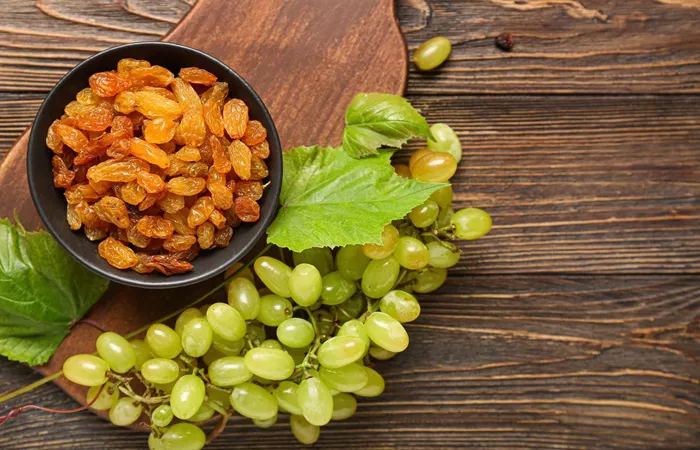Raisins, dried grapes packed with natural sugars, fiber, and essential nutrients, are a popular snack enjoyed by many people. But is it good to eat raisins every day? While raisins can be a nutritious and healthy food, consuming them daily might have different effects depending on your health and lifestyle. In this article, we will discuss the potential benefits and drawbacks of including raisins in your everyday diet. By the end, you’ll have a clear understanding of whether raisins are a healthy choice for you.
What Are Raisins?
Raisins are dried grapes that are often used as a snack, in baking, or as an addition to various dishes. They come in different varieties, including golden raisins, black raisins, and green raisins. These small, sweet treats are rich in natural sugars, fiber, vitamins, and minerals, making them a nutritious option for a quick snack or as part of a balanced meal.
Health Benefits of Eating Raisins
1. High in Nutrients
Raisins are a concentrated source of vitamins and minerals. They are rich in antioxidants, particularly polyphenols, which can help combat oxidative stress in the body. Raisins also provide essential nutrients like potassium, iron, calcium, and magnesium, which support heart health, bone health, and overall well-being. Additionally, raisins are a good source of B-vitamins, including vitamin B6, which plays a role in brain function and metabolism.
2. Rich in Fiber
One of the main benefits of raisins is their high fiber content. Fiber is essential for maintaining digestive health. It helps prevent constipation by promoting regular bowel movements and supports healthy gut bacteria. A diet high in fiber can also aid in weight management by helping you feel full longer, making raisins a satisfying snack option.
3. Supports Heart Health
Raisins are naturally rich in potassium, which is important for maintaining healthy blood pressure levels. Potassium helps balance the effects of sodium in the body, reducing the strain on the cardiovascular system. Including raisins in a balanced nutritious diet can help reduce the risk of heart disease.
4. Helps with Iron Absorption
Raisins are a good source of iron, which is vital for the production of hemoglobin and red blood cells. The iron in raisins is non-heme iron, which is better absorbed when consumed with foods rich in vitamin C. Pairing raisins with citrus fruits or vegetables can boost iron absorption, making them an excellent addition to a diet that supports healthy blood and energy levels.
Potential Risks of Eating Raisins Every Day
1. High in Sugar
Although raisins are a natural source of sugar, they still contain a significant amount of sugar per serving. Eating too many raisins can contribute to excess calorie and sugar intake, which may lead to weight gain or an increased risk of developing conditions like type 2 diabetes. It’s important to enjoy raisins in moderation and be mindful of their sugar content, especially if you’re managing your weight or blood sugar levels.
2. Can Cause Digestive Discomfort
Raisins are high in fiber, and while fiber is beneficial for digestion, too much fiber in one sitting can cause digestive discomfort, including bloating and gas. If you eat raisins in excess, it may overwhelm your digestive system, especially if you are not used to consuming high-fiber foods regularly. It’s essential to start with small amounts and gradually increase your intake to allow your digestive system to adjust.
3. Risk of Cavities
Raisins are sticky and can cling to your teeth, which may increase the risk of cavities if you don’t practice proper dental hygiene. The sugar in raisins can feed harmful bacteria in the mouth, leading to tooth decay. If you eat raisins daily, be sure to brush your teeth thoroughly afterward to prevent oral health issues.
Are Raisins a Healthy Snack for Kids?
Raisins can be a healthy snack for children when consumed in moderation. They provide essential nutrients like fiber, iron, and potassium, which contribute to a child’s overall health and development. However, like adults, children should not overconsume raisins due to their sugar content. Incorporating raisins as part of a well-balanced healthy diet for kids is a great way to boost nutrition without overloading on sugar.
How to Include Raisins in Your Diet
Raisins are versatile and can be enjoyed in various ways. Here are some simple ways to incorporate raisins into your daily meals:
1. Add to Breakfast
Raisins are a great addition to your morning routine. You can sprinkle them on top of your oatmeal, mix them into your yogurt, or add them to a smoothie. Their natural sweetness pairs well with whole grains and dairy products.
2. Use in Baking
Raisins can be used in baking to add sweetness and texture. They are commonly used in cookies, muffins, and breads. You can substitute raisins for other sweeteners or dried fruits in recipes for a healthier alternative.
3. Snack on Them
Raisins make an excellent on-the-go snack. Simply grab a small handful for a quick energy boost. Pair them with nuts or seeds for added protein and healthy fats to make a satisfying snack that will keep you full until your next meal.
Conclusion
In conclusion, raisins can be a healthy and nutritious addition to your diet when consumed in moderation. They offer numerous health benefits, including promoting heart health, providing fiber, and supporting iron absorption. However, it’s important to be mindful of the sugar content and potential digestive issues that may arise from eating too many raisins. If you’re looking for a natural snack that provides essential nutrients, raisins are a great choice, but always remember to balance them with other foods as part of a healthy diet.
Related topics:


